- Home
- George Zebrowski
Brute Orbits Page 6
Brute Orbits Read online
Page 6
The effort produced a sudden gurgling in his throat. He fell back and was still.
Howes knelt down, examined him, and said, “His throat’s busted…he choked to death.” He looked up at Tasarov, and for a moment it seemed he had lost his last friend in the world, as worthless as that friend had been.
“I didn’t try to kill him,” Tasarov said as Howes stood up.
“He would have killed you,” the younger man said. “It’s just as well. He was going crazy thinking about everything. He was no good. Got me caught the first time we ever did anything. Ruined my life, what there was of it.”
“I’m sorry, kid,” Tasarov said, almost meaning it, and still puzzled that he had not killed the little assassin after the first blow.
Howes looked up him. “Are you really the big shit he thought you were? He hated you like I never saw anyone hate.”
Don’t answer, Tasarov told himself, knowing that the younger man didn’t really expect an answer. And don’t ask him why he didn’t warn me, if Polau had bragged to him.
“I’ll bury him,” Howes said without looking at Tasarov. “I knew you’d get him.”
■
More than a hundred men spewed into the microphones over the next few weeks and months, as the habitat fell away into the abyss. Some men pleaded, others were heartfelt as they reached down into themselves to tear out their suffering and hurl it homeward. They sang their growing agony and horror, and were eloquent as if eloquence were a force of nature able to open hearts and minds, given to them as the last weapon they would yield against their own kind.
They were evil men, and good men who had done evil, confused and lost men; and not that different from the more successful, better protected criminals who still lived on the Earth and would never be caught or punished.
Finally, the Earth responded.
Warden Sanchez appeared in the hollow. His image snapped into view, and he seemed to be sitting like a big Buddha on the muddy land that now grew some pitiable green here and there. He seemed to look around at the toy town of barracks and human gnats who lived there, and he said with the voice of a god:
“These broadcasts will now stop. We are turning off the programs that govern the power to the transmitters.” His face was severe, as if he wanted to explain further but had decided not to.
“Can we turn it back on ourselves?” Tasarov asked Ruskin.
“Maybe.”
They were sitting on the steps to their barracks, taking in the sunplate’s light, which was preferable to the cold light of the engineering level.
“You have only yourselves to blame…” Sanchez continued as a shout of derision went up from the crowds looking up at his figure. More men came out of their barracks and spread out across the countryside, breaking up into groups, as if hunting for something.
Tasarov stood up and watched, wondering, then realized what was happening.
“They’re after the holo projectors,” Tasarov said, hoping that they were too well hidden to be found; they might be needed one day.
“Can Sanchez see them coming?” Ruskin asked.
“You know the equipment better than I do. Are they seeing us?”
Ruskin nodded. “They probably always could. Some of the men know where the projection points are. They’ve been over the ground by now.”
Tasarov gazed up at the giant sitting figure of Sanchez, and felt something of the rage that was in the inmates’ hearts. The warden could do nothing to stop them, but he still seemed unaware of what they were doing.
Sanchez stood up and walked around. The giant figure was impressive to the point where Tasarov almost expected to hear and feel his footfalls shaking the land.
“This will be my last appearance,” Sanchez said with his deep, growling voice, and was cut in two at the waist.
“They’ve damaged one of the projectors,” Ruskin said with a laugh.
Cheers went up from the men as they watched.
Sanchez was oblivious to what was happening. “I suggest that you seek order amongst yourselves. You will come to need it, since you will have to police yourselves in the coming decades.”
As he spoke, his bottom half moved away from his top; then his top and bottom separated into two sections, but each continued to move as part of the whole.
“He’s been quartered,” Tasarov said.
“We will not hear any more of your broadcasts,” Sanchez’s head continued. “They come from a small portion of the sky, and can be jammed. We didn’t want to send shutdown commands to your computers because we thought it best to be able to hear you, and observe your progress—but we will do so now…”
His voice faded, the quarters of his body melted away, and there was silence in the asteroid’s great hollow.
“They’ve found all the gear,” Ruskin said.
“A pity,” Tasarov said, wondering if turning off the communications gear was irrevocable. “Sanchez was impressive. I would have liked to have him around—once in a while.”
He would have been a link with home, Tasarov thought, and now there will be none.
■
The men were unusually quiet for the next few weeks, as it sank in how cut off they were from home now. It might have been better to have left the warden’s holo gear alone, but no one wanted to say so.
Tasarov retreated into himself, now that the broadcasts had been stopped. A few men came once in a while and spilled their guts bravely into the recording gear, and went away.
Tasarov now faced up to what he had been avoiding since the Dannemora break. His wipe had been another escape. But now, as he came back fully into himself, he realized that the Dannemora break had been a failure, if only for him—in the follow-up details, when he had chosen an incompetent wiper to hide his identity.
And here, his efforts to bring the men together through the shouts hurled back at Earth had also failed. What had he expected? That someone would come out and turn this prison around and take it home? He saw his whole life as a downhill slide—intelligent, yes, but achieving nothing like what the less gifted rebels had managed. He was just not the criminal he imagined himself to be; dumber ones had done better. It could not have been all bad luck. Even though his self criticism told him that he understood the problems and knew how to deal with them, the execution had failed too often. The world would always escape mental models, he told himself, and that was not the fault of reason and planning; that fault lay in the infinite richness of the world-system, and the unusual amount of bad luck that had come his way, for which he refused to take the blame.
So now what was left for him? Daily life and mathematics. He suspected that it might be possible to cancel the shutdown commands and restore communications with the Earth so that news of home might at least trickle in during the decades of life to be endured in the black desert of space, inside this spinning pot of mud and grass.
7
The Thinking Happiness
JUDGE OVERTON’S PRIVATE CHAMBER
* * *
“You put people in power over others and they will abuse it. Some will. They did experiments a hundred years ago to prove it, in which people zapped people with electricity just because they could. You can’t have guards in prisons. No guards, no wardens. That’s sitting on a volcano. Guards and correctional officers are only midpoints between civilians and criminals. Some of them have been criminals, like some cops are all their life. There’s no way to get a better class of guards. They only become targets, no matter how good they are. Come to think of it, real progress would be to get a better class of criminals.”
* * *
Tasarov found an old portable screen and keyboard in Warden Sanchez’s desk. It couldn’t connect to anything except an old printer, but it would do for what he needed.
Tasarov wrote, “I will set down what I can, so that whatever happens here will not be lost to future judgments. I can only guess at the opinions that will emerge. To write down what I can is the only useful task left to me as our isolati
on deepens. I may not live to the end of my sentence. I look around at this now silent communications area, and think of the engineering level that encircles the muddy land above me, and wonder how long the automated food systems can produce flavored proteins and fortified vegetable/grain substitutes without maintenance and repair. It might have been better to let us farm at least some of our food in the hollow as a help to our sanity; but they chose not to give us that. If any of these systems fail, we may die. As it is, the medical facilities are quite limited, despite Warden Sanchez’s recorded tips on how to use them. Mostly, we will have to rely on maintaining our health, such as it is for each man.
“Some of the men come to me for advice, but those who seek influence give themselves away by avoiding me. They have already created a currency of exchange by rounding up the more feminine young men to use as female surrogates. The homosexuals among us are not as discriminating; they choose among themselves, and perhaps even love in the truest sense, but are mocked by the professed heteros who trade their chattel. Thirty years will take the bloom off the purely sexual infatuations, but the old lovers may still cling to each other—”
Howes came in and Tasarov stopped writing.
“Can I talk to you?” asked the young man.
“Sit down,” Tasarov said. “What is it?”
Howes leaned forward uncomfortably, put his hands together across his knees, and spoke while looking down at the floor. “Are we so evil that they had to put us out here, Yevgeny?”
Tasarov sat back and said, “This has nothing to do with evil, son. This place is not bad, as prisons go. We don’t have the screws to deal with, for one thing. That’s actually an advance, a way of avoiding day-to-day abuse and cruelties. Takes the temptation away from guards. Better than a rock in the middle of San Francisco Bay, where you could see the city you were missing.”
“Were you there?” Howes asked.
“No—that was in the last century. They closed it as soon as inmates began to show they were brave enough to take it. They didn’t like setting them a challenge they could meet. Complete lockdown high tech prisons came in, and they were nearly escape proof and unbearable, but too costly to operate. They couldn’t put everyone in them, even though they were supposed to be for a very small group—but that group kept getting larger. This place is probably more frightening to people back home than it is to us. Who knows, we’ll swing out and come back in, and maybe we’ll be heroes, maybe. At least to some people.”
Howes sat up and looked at him. “It’s…do you feel empty and abandoned? I don’t think it would feel the same on Earth or on the Moon.”
“We all feel the difference, in one way or another. Something like this has never been done.”
“I feel,” Howes said, “that they think they’re all better than us. Maybe they are.”
Tasarov felt a surge of feeling, a concern for another human being as never before in his life; and yet it seemed to him that Howes was no one special. He didn’t seem to have any distinctive abilities or high intelligence. It was this place, heading out away from everything, that was throwing him into a compassionate state of mind which he could not trust, he told himself.
“They’re not better than us,” Tasarov said, “or we better than them.”
“They’ve taken everything from us,” Howes replied, avoiding his gaze.
“Look, son—any of us here, if we’d come up in their world, or gotten in with the rich and powerful gang families at the top, we would have done the same thing, and sent us out, or people like us. They don’t know what else to do.”
“I don’t get it.”
“We’re all the same. The problem is human beings. Always has been. Top, bottom, or middle, we all behave alike. We’ve pretty much always done so.”
“There are better people, somewhere,” Howes said.
“A few saints here and there, and even they have to work too hard at it. It’s too difficult to sustain. Those who achieve power usually mess it up. Seems there’s no point in raising up the powerless, because you get the same thing.”
“So you don’t blame them for sending us out?”
“I feel as much as you do,” Tasarov said, “but more may come of this than anyone knows.”
“I don’t deserve what’s happened to me,” Howes said.
There was a long silence between them. Then Tasarov asked, “Are they leaving you alone? I mean the others.”
“Funny,” Howes said. “They think I…belong to you.”
“We’re friends,” Tasarov answered quickly. “That much is true. It’s what they’re picking up.”
Howes looked at him. “You don’t feel more?”
Tasarov smiled. “I really do like women—and I’d like one right now. Stand-ins just don’t make it for me, even though I see how the illusion might be had.”
“The illusion?”
Tasarov nodded. “Soft skin, hairlessness, a vulnerable look in the eyes, and in the darkness friction is pretty much the same. It’s also about power—exerting your will on another human being. The genuine homosexuals can have what a man and woman can. The others are getting off on power and illusion. What it means is they’re going to trade people like animals.”
“You won’t tell them, will you?” Howes asked. “I mean, that we’re not…”
“I don’t care what they imagine—and you shouldn’t care either,” Tasarov said. “I don’t care if it helps you.”
“Thanks.”
Tasarov smiled. “As long as you don’t one day expect me to take it seriously.”
Howes looked embarrassed. “Of course not. I just can’t see it.”
The young man was still shaken up about Polau, Tasarov realized. It would have been more humiliating back home, the way Polau had picked and used him.
Tasarov didn’t mind queers, as such; human affections were versatile, and existed on a long spectrum; but the long history of social rejection had deformed this creative human exploration into something furtive and desperately predatory, especially in prisons, where it had become linked to tolerated rape, part of the punishment.
The ancient Greek and Roman acceptance had existed without labels, leaving individuals to find their tendencies. It had always seemed to him that there was for every gay or straight a possible individual somewhere who might arouse and lead them gladly against their grain; and the “next best thing to a woman” philosophy of prison populations certainly made hash of there being any one true path, without exceptions. No one knew what human freedom would find without early training taboos; but it was this very freedom that was feared.
He often felt a romantic fool for thinking it, but he believed with conviction that love beyond mere physicality was possible between any two living creatures in Darwin’s universe, given the right conditions of knowledge and communication. Possible, even if it rarely happened. How much denial and loneliness was necessary before any human being turned to the only available means of expressing love and physical affection? Might not great friends console each other, or even one console the other as with a ministering angel’s mercy, and would the means that might otherwise be repugnant become unimportant?
The answer was yes—sometimes.
Howes stood up and seemed about to speak, then simply nodded and left.
Tasarov smiled to himself, then wrote: “My kind has always sought to rip the devil from its heart and hurl him away. But he stays, no matter how often they cast him out.” It was a consoling thought, and a difficult one, since it involved a knot that first had to be tied correctly—or the problem would not be stated coherently—and then recognized as a knot that should not be untied—and that to cut it might be disastrous.
“We’re not machines or angels,” he wrote. “Worse, we need to be devils, to at least be able to choose wrongly, even if it be evil. Every effort to solve the problem of our capacity to choose evil freely breaks down to some degree, because what is to be solved, human freedom, is not all problem, it is only part of the problem.
Freedom to succeed or fail is what should be!”
A series of chance failures had imprisoned him inside this rock.
Think, he told himself, and write it down. It was all that was left to him. And he knew his thinking happiness as he had never known it before—that it was everything.
8
Rough Justice
Boosted into a twenty-five year loop, the second Rock went out a year after the first. Six months later, warfare broke out among the men over the female prisoners, of whom there were an equal number, but not all of equal desirability. The strongest men and women quickly devised weapons, knives and spears, and seized the prime specimens for themselves and as rewards for their followers. A quarter of the males organized to oppose the slavers and liberate the women, and the struggle began. The rest of the population simply tried to keep out of their way.
It had been thought that a male/female prison would be more just, more humane than the all male first Rock; and this might have been the case, except for the effect of John “Jimmy” Barr, a database criminal, who collected and memorized the means needed to steal data and sold that knowledge, priding himself on never having to do any job himself. He had killed two policemen when they came to arrest him. His defense had been that he had been so astonished at being caught selling information, since he believed it to be a statistical impossibility, that he had been driven temporarily insane, and hence was not responsible for the murders. Murder had never been his way. He blamed the police for driving him to it, and had conducted a countersuit even as his trial was beginning.
The Rock to which he had been committed was some seven kilometers long and four wide, with a sealed engineering level. The radio station incident of the first Rock was not to be repeated. The inmates might dig to find the engineering cavities; but this would be long, fruitless work, since they lacked proper tools. Nine hypothetical tries out ten would get them nowhere, and might even be dangerous.

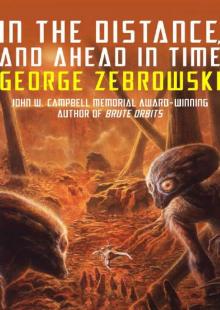 In the Distance, and Ahead in Time
In the Distance, and Ahead in Time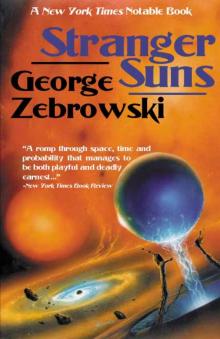 Stranger Suns
Stranger Suns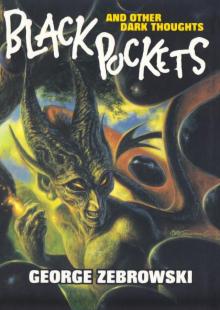 Black Pockets
Black Pockets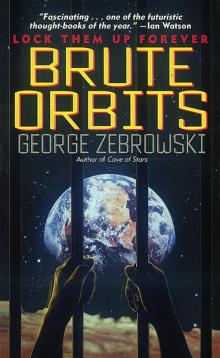 Brute Orbits
Brute Orbits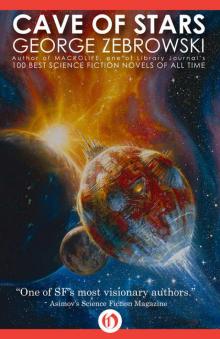 Cave of Stars (Macrolife Book 2)
Cave of Stars (Macrolife Book 2)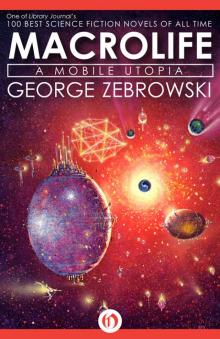 Macrolife
Macrolife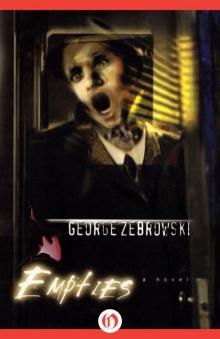 Empties
Empties Heart Of The Sun Star Trek 83
Heart Of The Sun Star Trek 83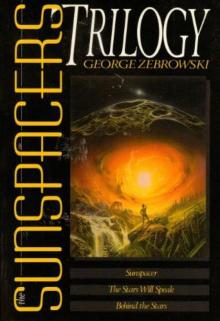 The Sunspacers Trilogy
The Sunspacers Trilogy